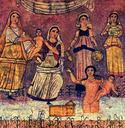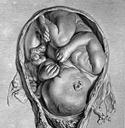Melvin Konner,
The Evolution of Childhood: Relationships, Emotion, Mind
(Belknap Press of Harvard University Press, 2010, 960 pages.).
Konner grounds his discussion of childhood development in evolution, allowing him to cite empirical research across the spectrum of cultures and species. His work concerns brain development, psychosocial development, language, gender differences, relationships in general and relationships between juveniles, kinds of parenting and child care, the role of playing in childhood learning (and teaching), stress, culture and enculturation, and epigenetics.
Observations gather momentum from preceding observations, laudably forming a coherent whole, despite the breadth of the undertaking. Such information, invaluable to a better understanding of the human person, is unfortunately couched in a materialist's worldview. The information remains invaluable to one who would read the data within a proper philosophical/ theological context, as the information provides powerful insights into the human person.
The author is an "environmental determinist" (p. 4), in the sense that he believes a person's genes and neural pathways continually respond and adapt to environmental conditions. There is no mention of free will and little room left for the mystery of the human person; the author refers instead to "self-organization" and tends to approach persons as puzzles to be solved, though the pieces are challenging, always adapting to the environment in which they are laid out (p. 173). "Complete explanation [of human relationships, emotion, mind] requires integration among the levels" (p. 29), these "levels" being phylogenetic constraints, ecological/demographic causes, genome, embryogenetic/ maturational processes, formative early-environmental effects, ongoing environmental effects, longer-term physiology, short-term physiology, elicitors and releasers (pp. 28-29).
How is Konner so certain that such an explanation is "complete"? In other words, why not leave room for the mere possibility of immaterial causes, such as a human soul expressing itself through DNA or neural pathways? Ironically, what may have begun as a scientist's modest, professional attempt to prescind from philosophy/ theology ends in a particular philosophical/ theological assumption, namely that of a strict materialist and atheist.
Nonetheless, Konner successfully challenges many popular notions, and proposes some original insights. Concerning parenting, for example, he shows that head-start programs and child-rearing patterns have decreasingly detectable effects as the length and rigor of studies increase (p. 611). Also, a stress-free childhood is not optimal: what he terms good stress creates the opportunity for growth and development (pp. 540, 747). The kind and amount of stress is what is critical: work around the farm gives children a sense of worth and competence, but school work "exploits children just as chores do, while giving many a sense of failure" and "often prepares children for jobs that do not exist" (p. 649).
He also offers a simple evolutionary explanation for "teenage rebellion." Juvenile brains may be programmed to invent new behaviors, which are then pruned and refined by environmental rewards and punishments (analogous to the development of speech from babble), thus allowing whole communities to adapt quickly and to survive in the face of sometimes rapid environmental changes (pp. 738-9). These insights alone could calm many an over-scheduled, tension-fraught American household.
Viewed simply as a summary of research, the book makes an important contribution to an empirical understanding of human nature. Internally, it even evidences some openness to dialogue with philosophy/ theology, as when the author remarks: "there are environmental circumstances in which it is adaptive to grow up faster and begin reproducing earlier, but such arguments do not remove the need to make judgments about the kind of adolescence we want for them [our children]" (p. 531). However, other passages frustrate the possibility of dialogue, as when Konner appears happy to leap from a factual "is" to an ethical "ought" without any explanation of his philosophical method (p. 331).
Juliana Weber is a graduate of Ave Maria University currently working in Religious Education at a parish in the Archdiocese of Washington. She also holds a BA in Psychology from SUNY-Fredonia.



